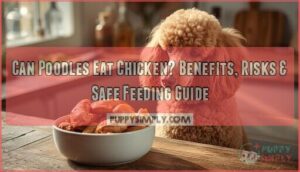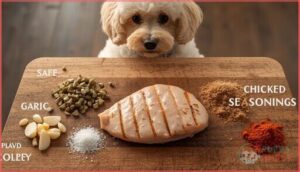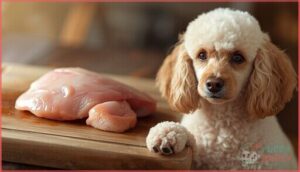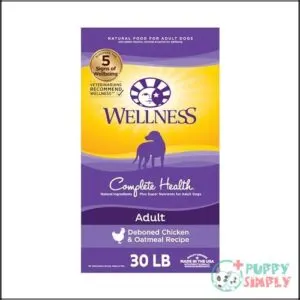This site is supported by our readers. We may earn a commission, at no cost to you, if you purchase through links.
Yes, poodles can eat chicken, and it’s actually one of the best protein sources you can offer your curly-coated companion. Chicken provides essential amino acids that support muscle development, along with vitamins and minerals that keep your poodle’s coat shiny and energy levels high.
However, preparation matters more than you might think. Plain, boneless, cooked chicken is safe and nutritious, but adding the wrong seasonings, leaving bones in, or serving it raw can turn a healthy meal into a health hazard.
Understanding how to properly prepare and portion chicken ensures your poodle gets all the nutritional benefits without the risks that send dogs to emergency vet visits.
Table Of Contents
- Key Takeaways
- Can Poodles Eat Chicken Safely?
- Nutritional Benefits of Chicken for Poodles
- Safe Chicken Preparation for Poodles
- Risks of Feeding Chicken to Poodles
- Chicken Allergies in Poodles
- Can Poodles Eat Raw Chicken?
- Feeding Canned Chicken to Poodles
- How Much Chicken Should Poodles Eat?
- Chicken as a Treat or Training Reward
- Top Chicken Dog Foods for Poodles
- Frequently Asked Questions (FAQs)
- How much chicken should I feed my poodle per day?
- What are some alternatives to chicken I can feed my poodle?
- Is chicken or beef better for my poodle?
- Are there any side effects I should look out for if feeding my poodle chicken?
- What happens if my poodle eats a chicken bone?
- Can poodles eat chicken necks or feet?
- Is chicken broth safe for poodles?
- Can poodles eat chicken liver or organs?
- How long does cooked chicken last for dogs?
- Can poodles eat rotisserie chicken from stores?
- Conclusion
Key Takeaways
- Chicken provides high-quality protein and essential nutrients for poodles, but it must be plain, boneless, and fully cooked to 165°F to avoid serious health risks like bacterial contamination, choking hazards, and pancreatitis from bones, skin, or fat.
- Proper portion control is critical—chicken should never exceed 10% of your poodle’s daily calories, with amounts adjusted based on size (roughly 1/3 cup cooked chicken for a 30-pound dog) to maintain balanced nutrition.
- Watch for signs of chicken allergy in your poodle, including skin irritation, digestive upset, or chronic ear infections, which affect about 15% of dogs and require switching to alternative proteins like lamb, turkey, or fish.
- Store-bought rotisserie chicken, raw chicken, and chicken with seasonings or bones pose significant dangers—always prepare chicken yourself using boiling or baking methods, and remove all bones, skin, and fat before serving.
Can Poodles Eat Chicken Safely?
Yes, poodles can safely eat chicken when it’s prepared correctly. Chicken offers high-quality protein that benefits your poodle’s health, but you’ll need to follow specific guidelines to avoid potential risks.
Let’s look at what makes chicken a safe choice for your poodle’s diet.
Chicken as a Protein Source for Poodles
Chicken delivers a digestible protein source for poodles, packed with amino acids they can’t make on their own. Each 100-gram serving brings roughly 30 grams of quality animal protein—fuel for muscle maintenance and tissue repair.
With a biological value score of 79, this lean protein meets industry quality standards while supporting your poodle’s energy needs and physical health throughout every life stage.
A recent study suggests fermentation-derived chicken protein may also offer digestive benefits for dogs.
Recommended Serving Methods
You can safely serve your poodle boiled chicken, the preferred method since boiling retains protein without adding fat. Bake it plain as an alternative, reaching 165°F internally. Shred or cube the cooled meat, removing all bones, skin, and fat.
Mix it with their kibble or plain rice for easier digestion. Boiled chicken is a healthy option trusted by veterinarians.
Portion sizes depend on your dog’s weight, but keep chicken under 10% of daily calories.
Importance of Diet Balance
While chicken offers excellent protein, your poodle’s nutritional needs extend far beyond a single ingredient. Balanced meals require proper nutrient proportions, including diverse protein sources, adequate fiber intake, and essential vitamin and mineral intake to prevent deficiencies.
A truly balanced diet includes:
- High-quality proteins from varied sources
- Complex carbohydrates for sustained energy
- Healthy fats supporting coat and skin health
- Vitamins like D3, E, and B12
- Minerals including zinc, selenium, and manganese
Protein diversity prevents nutritional gaps that single-source diets create.
Nutritional Benefits of Chicken for Poodles
Chicken isn’t just a tasty meal for your poodle—it’s packed with nutrients that support their health in real, measurable ways. From building strong muscles to keeping their coat shiny, this lean protein delivers benefits you’ll actually notice.
Let’s break down what makes chicken such a nutritional powerhouse for your pup.
Protein Content and Muscle Health
For fueling your poodle’s muscle health, protein is the MVP. Chicken delivers approximately 31 grams of protein per 100 grams of cooked breast, supplying all 10 essential amino acids your dog needs. This complete animal protein source aids muscle maintenance and growth, with chicken digestibility exceeding 90%. That means your poodle’s body efficiently uses these amino acids for tissue repair and energy.
| Body Weight | Daily Protein Needs | Chicken Portion |
|---|---|---|
| 10 lbs | ~12 grams | 1/8 cup cooked |
| 20 lbs | ~24 grams | 1/4 cup cooked |
| 40 lbs | ~48 grams | 1/2 cup cooked |
Active and senior poodles particularly benefit from adequate protein intake, as dietary protein prevents muscle loss and maintains lean body mass throughout their lives.
Essential Vitamins and Minerals
Beyond protein, your poodle gains a treasure chest of nutrients from chicken. The B vitamins in chicken—particularly B6 (0.5 mg per 100g) and niacin (7.1 mg)—power energy metabolism and nerve function. Mineral absorption is equally impressive:
- Zinc (1.3 mg) strengthens immunity and skin integrity
- Iron (0.7 mg) bolsters healthy red blood cells
- Selenium (14 mcg) provides antioxidant support
These nutrients work together, advancing bone health and overall vitality.
Chicken for Weight Management
If your poodle needs to slim down, lean chicken becomes a powerful ally. With just 165 kcal per 100 grams, it delivers protein while aiding calorie control and lean muscle preservation during weight loss.
| Dog Size | Daily Chicken Portion | Protein Focus |
|---|---|---|
| Extra-small (2–20 lbs) | 1 tablespoon | Muscle maintenance |
| Medium (31–50 lbs) | ¼ cup | Fat reduction |
| Large (51–90 lbs) | ⅓ cup | Satiety support |
| Extra-large (91+ lbs) | ½ cup | Metabolic health |
| All sizes | Max 10% daily calories | Balanced diet |
Weight management formulas featuring chicken contain 25% less fat than standard kibble, with clinical outcomes showing improved body condition scores within 8–12 weeks. This protein source aids dog nutrition goals while maintaining energy levels throughout your poodle’s weight loss journey.
Safe Chicken Preparation for Poodles
If you’ve decided to add chicken to your poodle’s meals, the way you prepare it matters just as much as the chicken itself.
Proper cooking and handling can keep your dog safe from harmful bacteria and choking hazards.
Let’s walk through the key preparation steps you’ll want to follow every time.
Cooking Methods (Boiling, Baking)
When preparing chicken for your poodle, boiling and baking are the safest options. Boiling benefits include fat reduction and improved digestibility, especially for sensitive stomachs. Baking ensures that nutrients remain more intact during cooking. Both methods require reaching an internal temperature of 165°F to ensure the chicken is cooked safely.
For a safety comparison, boiled chicken offers greater digestibility, while baked chicken recipes preserve more vitamins.
Importance of Removing Bones
Even though your poodle may beg for every scrap, chicken bones pose serious dangers you can’t ignore. Chicken bones splinter easily, creating choking hazards and internal injuries from sharp fragments. These risks affect bone safety for dogs regardless of the cooking method. Prompt veterinary care is essential if your poodle accidentally ingests bones.
- Splintering risk: Hollow chicken bones break into sharp pieces that puncture the stomach or intestines
- Choking hazards: Bones can lodge in the throat, blocking airways and requiring emergency intervention
- Digestive issues: Fragments cause inflammation, vomiting, and potentially fatal intestinal blockages
- Bacterial risks: Raw bones carry Salmonella and Campylobacter, increasing infection likelihood through internal wounds
Avoiding Seasonings and Spices
Plain chicken is your safest bet—seasonings that make your meal delicious can seriously harm your poodle. Toxic seasonings like garlic and onion damage red blood cells, while salt risks cause dehydration at levels above 0.3% sodium. Even paprika triggers vomiting.
Skip all spices when preparing homemade dog food. Safe herbs like parsley work occasionally, but plain, unseasoned chicken remains the best option for safe human foods for dogs.
Risks of Feeding Chicken to Poodles
While chicken offers many nutritional benefits for your poodle, it’s not without its potential pitfalls. From dangerous bone fragments to hidden sources of bacteria, there are several important concerns you need to be aware of before adding chicken to your dog’s bowl.
Let’s look at the main risks that every poodle owner should understand.
Dangers of Cooked Chicken Bones
Cooked chicken bones pose serious threats to your poodle’s health. When heated, bones become brittle and splinter easily, creating sharp fragments that can puncture your dog’s throat, stomach, or intestines.
These bone shards cause choking hazards, internal bleeding, and organ perforation. Emergency clinics report that up to 30% of gastrointestinal emergencies involve cooked chicken bones, with small breeds facing the highest risk.
Bacterial Contamination and Foodborne Illness
Beyond bone hazards, bacterial contamination poses another major threat when feeding chicken to your poodle. Raw chicken carries foodborne illnesses like salmonella—detected in 80% of raw chicken diet samples—and Campylobacter, found in 58% of chicken meat.
These bacterial infections cause vomiting, diarrhea, and potentially life-threatening complications. Cooking eliminates bacteria when you reach 165°F internally, making safe handling practices and proper preparation essential for protecting your dog.
Risks of Excessive Fat and Skin
While properly cooked chicken poses minimal danger, chicken skin and fat content can trigger serious health problems in poodles. High-fat portions increase pancreatitis risk—a painful pancreatic inflammation causing vomiting and lethargy.
Obesity concerns also emerge from fatty chicken, leading to weight gain and digestive problems.
Follow fat guidelines by removing skin before serving, as even small amounts can cause GI distress with long-term effects on your poodle’s health.
Chicken Allergies in Poodles
While chicken is generally a safe protein for most poodles, some dogs can develop allergies to it over time. Chicken ranks among the top five allergenic proteins for dogs, with roughly 15% of all dogs showing some sensitivity.
If your poodle is allergic, you’ll notice specific signs that affect their skin, digestion, or breathing.
Common Allergy Symptoms
If your poodle has a chicken allergy, you’ll likely notice skin irritation first—redness, itching, or rashes on the paws, ears, and belly. Digestive issues like vomiting or diarrhea affect over 17% of allergic dogs. Watch for chronic ear infections, excessive paw licking, and respiratory symptoms such as coughing. These allergic reactions signal your dog’s immune system is responding negatively to chicken protein.
Identifying and Managing Allergies
Once you notice allergy symptoms, start an elimination diet trial—the best approach for diagnosing dog food allergies. Remove all chicken sources for 8–12 weeks, following veterinary protocols carefully. Over 85% of poodles with a chicken allergy improve within five weeks. If symptoms resolve, you’ve likely found the culprit. Long-term management means switching to alternative proteins like lamb, turkey, or salmon, ensuring your poodle thrives without allergic reactions.
Steps to Identify and Manage Chicken Allergies:
- Complete an elimination diet trial under veterinary supervision, removing all chicken (including treats and medications) for 8–12 weeks
- Monitor symptom improvement throughout the trial—most dogs respond within five to eight weeks
- Shift to alternative proteins permanently once chicken is confirmed as the allergen, maintaining strict avoidance
Alternatives for Sensitive Dogs
If chicken doesn’t work for your poodle, you’ve got solid options. Novel proteins like lamb, duck, or venison sidestep common allergens, while hydrolyzed formulas break protein into tiny peptides that won’t trigger reactions. Plant-based options and limited ingredient diets simplify menus, reducing exposure risks. Since food allergies affect up to 24% of dogs with skin conditions, choosing the right alternative matters.
| Protein Type | Best For |
|---|---|
| Novel proteins (lamb, fish, venison) | Dogs needing hypoallergenic nutrition |
| Hydrolyzed formulas | Severe food intolerance cases |
| Plant-based options | Poodles sensitive to all meat proteins |
Can Poodles Eat Raw Chicken?
Raw chicken is a topic that sparks debate among dog owners, and you might be wondering if it’s safe for your poodle. While some people feed their dogs raw diets, there are important health and safety considerations you need to understand first.
Let’s look at the potential risks, proper handling techniques, and commercially prepared raw chicken options that might work for your poodle.
Potential Health Risks
Feeding your poodle raw chicken isn’t without risks. Salmonella exposure tops the list—nearly half of ground chicken samples carry the bacteria. Bone splintering from cooked bones can tear intestines, while fat overload may trigger pancreatitis.
Food allergies affect about 15% of dogs, causing skin rashes and digestive upset.
Diet imbalance from relying too heavily on chicken can weaken your poodle’s immune system over time.
Safe Handling Practices
If you’re considering raw chicken for your poodle, food safety becomes non-negotiable. Bacterial contamination—from salmonella to E. coli—poses real threats to both you and your pet.
Here’s how to minimize risk:
- Clean all surfaces with one tablespoon bleach per gallon of water
- Wash hands for at least 20 seconds after handling
- Freeze chicken three days before feeding to reduce parasites
- Store defrosted chicken below 40°F and use within two days
- Supervise feeding in easy-to-clean areas
Cross-contamination prevention and hand hygiene aren’t optional—they’re essential protective measures.
Store-Bought Raw Chicken Foods
Store-bought raw chicken foods offer convenience, but you need to weigh the trade-offs. The raw dog food market hit $17.5 billion in 2023, with brands like The Farmers Dog and Primal Pet Foods promoting USDA-inspected, nutritionally complete formulas. However, contamination risks remain real—87% of chicken-based raw foods in one study carried antibiotic-resistant E. coli, and salmonella recalls have affected major brands.
| Advantage | Challenge |
|---|---|
| Nutritional completeness with balanced macronutrients | Bacterial contamination (Salmonella, E. coli) detected in most samples |
| USDA-inspected ingredient sourcing from premium brands | Regulatory oversight split between FDA and USDA creates gaps |
| Convenient delivery models nationwide | Recalls due to microbial safety continue industry-wide |
Raw food diets for dogs require strict handling protocols to protect your household from zoonotic illness.
Feeding Canned Chicken to Poodles
Canned chicken can be a convenient option for poodle owners, but not all varieties are safe for your dog. You’ll need to pay attention to what’s actually in the can, since many products contain ingredients that aren’t ideal for canine consumption.
Let’s look at the key factors when choosing and feeding canned chicken to your poodle.
Choosing Low-Sodium Options
Not all canned chicken is created equal in terms of sodium content. Standard products can pack over 400 mg of sodium per serving, while low-sodium versions drop that to just 40-60 mg. Look for labels that say “no salt added” and skip anything in brine.
Brands like Dave’s Pet Food and Evanger’s offer safer choices for poodles, keeping health effects minimal in a balanced diet.
Frequency and Portion Control
You don’t want to turn canned chicken into a poodle’s daily staple. Treat it as an occasional addition, not a regular meal. Stick to the same daily chicken limits you’d apply to fresh-cooked portions—about 1/4 cup per 20 pounds of body weight.
For puppies, puppy feeding frequency matters: split smaller portions across 3–4 meals. Senior poodle portions stay lighter, around two smaller daily servings. Following veterinary portion advice keeps your poodle’s balanced diet on track.
Preservative and Additive Concerns
Beyond portion size, canned chicken dog food ingredients deserve scrutiny. Synthetic preservatives like BHA and BHT raise cancer concerns in animal studies. High sodium content can trigger sodium toxicity and digestive upset in your poodle.
Flavor enhancers and artificial colorings offer zero nutritional value while potentially causing allergies.
Look for preservative-free options with natural alternatives such as vitamin E, ensuring better dog food safety and nutrition for your pet.
How Much Chicken Should Poodles Eat?
Getting the portion size right is key to keeping your poodle healthy and happy. The amount of chicken your dog needs depends on their size, age, and how active they are.
Let’s break down the feeding guidelines so you can confidently add chicken to your poodle’s meals.
Portion Guidelines by Size and Age
Your poodle’s chicken portions depend on size, age, and activity level. Miniature Poodle puppies need 90–130 grams daily across three meals, while adults require 100–140 grams in two servings. Senior diets generally call for slightly less—around 90–130 grams—due to slower metabolism.
A 30-pound active poodle can enjoy about 1/3 cup of cooked chicken daily as part of balanced nutritional requirements for poodles.
Frequency of Chicken Meals
Feeding guidelines for poodles suggest offering chicken two to three times weekly rather than daily. This rotation prevents over-reliance on a single protein and reduces allergy risks—15% of dogs show sensitivity when chicken dominates their diet.
Adult poodles thrive on twice-daily meals, while puppies need three to four smaller servings. Seniors do best with two lighter chicken-centered portions for easier digestion and sustained energy.
Integrating Chicken Into a Balanced Diet
You can’t rely on chicken alone—your poodle needs a complete picture. Pair lean breast meat with complementary foods to meet all nutritional needs:
- Whole grains like rice supply carbohydrates for sustained energy
- Dog-safe vegetables (carrots, peas) add fiber and vitamins A, C, and K
- Calcium supplements or eggshell powder balance boneless chicken meals
This approach honors your poodle’s dietary needs while maximizing chicken’s nutritional value as a protein source.
Chicken as a Treat or Training Reward
Chicken works wonderfully as a training reward or occasional treat for your poodle, especially when you’re reinforcing good behavior. The key is keeping portions small and preparation simple, so your dog gets the benefit without any digestive upset.
Let’s look at how to use chicken effectively as a treat, how much is safe, and what signs to watch for.
Cooked Chicken Treat Ideas
Looking for ways to reward your poodle? Homemade chicken treats offer countless options. You can bake Chicken Biscuits using oats and eggs, roll Chicken Meatballs for training sessions, or create Homemade Jerky in your oven. Frozen Bites work great on warm days.
Store treats in the fridge for one week or freeze for three months. These safe chicken preparation methods support dog health naturally.
Moderation and Digestive Health
When you’re using chicken as a reward, portioning matters for digestive health. Small dogs like poodles should get only about 2 tablespoons per serving, keeping chicken under 10% of daily intake.
Gradual introduction protects the gut microbiome from disruption that triggers digestive problems. Safe preparation without seasonings prevents dog health issues, while consistent moderation helps you avoid diarrhea or gas from a sudden chicken diet shift.
Monitoring for Adverse Reactions
After each chicken treat, watch your poodle for allergic reaction signs—skin symptoms like itching or redness, plus digestive issues including vomiting and diarrhea.
Symptom observation over 24-48 hours helps with allergy confirmation. If problems appear, immediate dietary adjustments and veterinary checkups are essential.
Probiotic support may aid recovery, but only your vet can determine if chicken should stay in your dog’s diet.
Top Chicken Dog Foods for Poodles
If you’d rather buy commercial dog food than prepare chicken meals at home, plenty of high-quality options are available.
The following products feature chicken as the main protein source and are formulated to meet your poodle’s nutritional needs.
Each offers different benefits, so you can choose one that fits your dog’s specific dietary preferences and health requirements.
1. Wellness Complete Health Chicken Oatmeal
If you want a balanced diet that your poodle will actually enjoy, Wellness Complete Health Chicken Oatmeal delivers solid nutrition without cutting corners.
This dog food contains 24% protein from real deboned chicken and chicken meal, plus oatmeal and brown rice for steady energy. You’ll find no corn, wheat, or soy here—just quality ingredients like spinach, blueberries, and carrots.
With 434 calories per cup and added glucosamine for joint support, it’s a recipe that checks the boxes for adult poodles needing complete nutrition.
Best For: Adult poodles who need high-quality protein and joint support, especially those with sensitive stomachs or skin issues.
- Real deboned chicken as the first ingredient with 24% protein for muscle health and energy
- Includes glucosamine and omega fatty acids to support joints, skin, and coat
- No corn, wheat, or soy, plus added probiotics for easier digestion
- Higher price point at $69.98 for 30 pounds compared to budget brands
- Some dogs may need a gradual transition period to adjust to the taste and texture
- Not ideal for poodles with specific poultry allergies or dietary restrictions
2. Instinct Original Chicken Grain Free Food
If your poodle thrives on protein-rich meals, Instinct Original Chicken Grain Free Food offers 41% crude protein from cage-free chicken and a raw coated kibble design that delivers freeze-dried raw chicken on every piece.
With 70% animal ingredients, zero grains, and probiotics for digestion support, this dog food balances nutrient density with ingredient purity. The grain-free benefits work well for poodles needing a balanced diet without corn, wheat, or soy.
Plus, omega fatty acids promote healthy skin and coat in your poodle.
Best For: Poodle owners looking for high-protein, grain-free kibble with raw coating to support digestion, skin, and coat health across all life stages.
- Contains 41% protein from cage-free chicken and 70% animal ingredients, making it ideal for active poodles needing muscle support and energy.
- Freeze-dried raw chicken coating on every kibble piece adds natural flavor and nutrients while probiotics help with digestion.
- Omega-3 and omega-6 fatty acids promote shiny coats and healthy skin, which is especially important for poodles prone to coat issues.
- Higher price point at $24.99 for 4 lbs compared to conventional dog foods, which can add up for larger poodles or multi-dog households.
- Some dogs may experience digestive upset during the transition period, especially if switching from a different food type.
- A few picky eaters may not take to the taste, and the grain-free formula may not suit dogs with certain allergies or sensitivities.
3. Canidae Chicken Lentil Potato Dog Food
For nutritional adequacy without breaking the bank, Canidae Chicken Lentil Potato Dog Food delivers free-range chicken as the first ingredient, paired with responsibly sourced lentils and potatoes that support your poodle’s energy levels. This grain-free formula earned a 5-star rating from Dog Food Advisor, with customer reviews averaging 4.7 out of 5 stars for taste and digestibility.
The ingredient analysis shows 30% crude protein and probiotics for gut health. At roughly $18 to $25 per 4-pound bag, price comparison reveals solid value.
Safety evaluation confirms no recalls as of November 2025, making this a trustworthy choice for your poodle’s dog diet.
Best For: Dog owners seeking a high-protein, grain-free formula with quality ingredients and a strong safety record, especially for poodles with sensitive stomachs or food allergies.
- Free-range chicken as the first ingredient with 30% crude protein supports lean muscle mass and overall health.
- Earned a 5-star rating from Dog Food Advisor and averages 4.7 out of 5 stars from customers for taste and digestibility.
- No recalls as of November 2025, with natural preservatives and consistent quality control for peace of mind.
- Price point of $18 to $25 per 4-pound bag is higher than many competitors, which may not fit every budget.
- Some dogs may not see complete allergy relief, as individual sensitivities vary.
- Requires proper storage to maintain freshness, with a few reports of rancid smell if not sealed correctly.
4. Orijen Grain Free Original Dog Food
If you’re after high-protein kibble with proven safety, Orijen Grain Free Original Dog Food packs 38% crude protein from fresh chicken, raw turkey, and whole fish—no recalls recorded to date.
Ingredient sources include 25% fresh chicken and organ meats for nutrient density your poodle needs. Though included in the FDA’s 2019 grain-free investigation, peer-reviewed studies found no taurine decline in dogs fed this formula.
Supplement additives like glucosamine (600–700 mg/kg) support joint health, making it a solid choice for active poodles.
Best For: Dog owners seeking premium, protein-rich kibble for active or athletic poodles who need nutrient-dense food without grain fillers.
- Delivers 38% crude protein from fresh chicken, raw turkey, and whole fish—plus organ meats for complete nutrition.
- Clean safety record with no recalls in the U.S., Canada, or Europe, and peer-reviewed studies show no taurine decline in dogs.
- Includes 600–700 mg/kg glucosamine and 600 mg/kg chondroitin to support joint health in active dogs.
- Higher price point than most dog food brands, which may not fit every budget.
- Recent formula changes have caused adverse reactions in some dogs, including digestive issues.
- Was part of the FDA’s 2019 grain-free diet investigation linked to potential heart disease, though no direct causality was proven.
5. Nulo Frontrunner Chicken Oats and Turkey
For poodles thriving on grain-inclusive formulas, Nulo Frontrunner Chicken, Oats & Turkey delivers 27% protein content with 77% from animal sources. Customer reviews consistently praise its digestive health aids through GanedenBC30 probiotics (80 million CFU per pound).
Nulo ingredients include deboned chicken, oats, and turkey meal—no starchy fillers. This dog food earned a 5-star rating from Dog Food Advisor, confirming its breed suitability for poodles.
At 431 calories per cup, it aids active dogs while meeting canine nutrition standards through careful dog food ingredient analysis.
Best For: Owners of active poodles who want a grain-inclusive, high-protein formula with probiotics to support digestive health and sustained energy.
- 27% protein with 77% from animal sources (chicken and turkey) supports lean muscle development
- GanedenBC30 probiotics (80 million CFU per pound) promote gut health and immune function
- Low-glycemic ancient grains like oats and millet provide steady energy without starchy fillers
- Higher price point compared to many other dog food brands
- Some dogs may experience digestive upset or food sensitivities during transition
- Not suitable for poodles requiring grain-free diets due to allergies
Frequently Asked Questions (FAQs)
How much chicken should I feed my poodle per day?
Your poodle’s size determines the right amount. A 30-pound dog usually needs about 1/3 cup of cooked, unseasoned chicken daily, which shouldn’t exceed 10% of their total caloric intake for balanced nutrition.
What are some alternatives to chicken I can feed my poodle?
If your poodle doesn’t tolerate chicken well, consider lamb, turkey, or fish proteins as alternatives. Novel proteins like venison or duck work well for sensitive dogs.
Beef offers iron-rich nutrition for balanced dog food options.
Is chicken or beef better for my poodle?
Both animal protein sources offer nutritional value, yet chicken digestibility wins for sensitive poodles needing weight management. Beef allergies affect 34% of dogs versus 15% for chicken, though cost comparison shows beef runs pricier for your poodle’s dietary needs.
Are there any side effects I should look out for if feeding my poodle chicken?
Watch for digestive upset like vomiting or diarrhea, allergic reactions including skin irritation and paw licking, and weight changes.
Chicken allergy symptoms in poodles may appear as ear infections or gastrointestinal distress requiring veterinary attention.
What happens if my poodle eats a chicken bone?
A single chicken bone can become a ticking time bomb in your poodle’s digestive system.
Choking hazards, internal bleeding, intestinal blockage, and gastroenteritis are serious risks requiring emergency management and immediate veterinary care.
Can poodles eat chicken necks or feet?
Chicken necks and feet offer glucosamine and protein benefits for poodles but pose serious bone hazards and allergy risks.
Safe preparation through boiling reduces bacterial contamination, though veterinarians recommend supervision and infrequent feeding to minimize choking dangers.
Is chicken broth safe for poodles?
Yes, chicken broth is safe for poodles when homemade without onions, garlic, or excess sodium. Homemade broth benefits include hydration support and joint health.
Check broth sodium levels carefully, as high amounts cause digestive issues.
Can poodles eat chicken liver or organs?
Like a treasure chest that requires careful rationing, chicken liver and organs pack considerable nutritional value for poodles—but only when served wisely.
These nutrient-dense foods offer essential vitamins and minerals, yet portion control prevents vitamin A toxicity risks.
How long does cooked chicken last for dogs?
Cooked chicken stored in an airtight container lasts 3-4 days in your refrigerator. Beyond this timeframe, bacterial growth increases sharply, raising foodborne illness risks.
Freeze portions for up to six months to extend safe storage.
Can poodles eat rotisserie chicken from stores?
That rotisserie chicken from the store is like a beautifully wrapped present hiding some unwelcome surprises.
Poodles shouldn’t eat it—sodium content, bone dangers, skin risks, and seasonings create serious health concerns despite its convenience.
Conclusion
Feeding your poodle properly prepared chicken puts powerful protein on their plate without putting them at risk. Skip the bones, ditch the seasonings, and stick to plain, cooked portions that match your dog’s size and activity level.
Now you know poodles can eat chicken safely—and exactly how to serve it. When done right, chicken becomes more than just a meal—it’s fuel that keeps your poodle healthy, happy, and thriving for years to come.
- https://sg.iams.asia/dog/dog-articles/can-dogs-eat-chicken
- https://barfindia.com/blogs/blog/unraveling-the-dangers-of-chronic-feeding-of-chicken-to-dogs-a-comprehensive-guide
- https://vetslovepets.com.au/blogs/dog/toy-poodle-feeding-guide
- https://www.thinkjinx.com/blogs/news/dog-breeds-most-prone-to-chicken-allergies
- https://www.allpoodleinfo.com/poodle-feeding



















